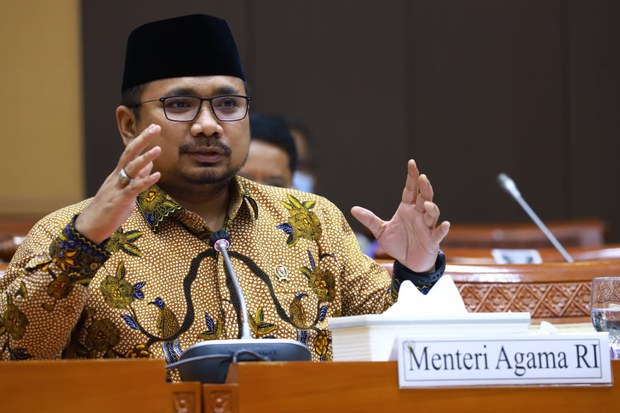Gaffes trip up Indonesian religion minister’s push for moderation
2022.03.18
Jakarta
 Muslims attend prayers to mark the Eid al-Adha festival at the Baiturrahman Grand Mosque in Banda Aceh, Indonesia, July 20, 2021.
Muslims attend prayers to mark the Eid al-Adha festival at the Baiturrahman Grand Mosque in Banda Aceh, Indonesia, July 20, 2021.
Poor communication, such as likening the Muslim call to prayer to the barking of dogs, could complicate the Indonesian religious affairs minister’s push for inclusivity and religious moderation.
Since taking office in December 2020, the gaffe-prone minister, Yaqut Cholil Qoumas, 47, has found himself in hot water several times.
Earlier this week, dozens of Muslims from a group called Action to Defend Islam rallied outside National Police headquarters and demanded that he – the minister of religious affairs of all people – be arrested for blasphemy for his baffling choice of words in which he compared the muezzin’s summons to prayer over loudspeakers to dogs barking.
Indonesia is the world’s most populous Muslim-majority country and, in Islam, canines are considered to be unclean.
“I think bad political communication is to blame for the anger of some groups towards Minister Yaqut,” said Ujang Komarudin, a political analyst at Al Azhar University Indonesia.
It all began with a circular issued in February by Yakut’s ministry that regulated the use of loudspeakers in mosques and prayer rooms to reduce noise.
Responding to criticism about the guideline, Yaqut said last month: “If our neighbors have dogs and they all bark at the same time, don’t we think it’s a disturbance? Therefore, we have to regulate all noises so they don’t become a nuisance.”
The unflattering comparison angered many Muslims here, so much so that a former minister filed a police complaint against Yaqut, accusing him of blasphemy. But police did not pursue the case.
Yaqut’s office has rejected accusations that he was comparing the call to prayer to barking dogs.
“The minister was providing an example – an example about the importance of regulating noise,” said the spokesman for the ministry, Thobib Al Asyhar, in a statement last month.
“Muslims who live as a minority group in places where many people keep dogs will definitely be disturbed if their neighbors are intolerant,” he explained.
When President Joko “Jokowi” Widodo named Yaqut as religious affairs minister, proponents of religious freedom in this multi-faith archipelago nation welcomed his appointment. Yaqut is the former chairman of the youth wing of Nahdlatul Ulama, the country’s largest Islamic organization.

Yaqut Cholil Qoumas, Indonesia’s minister of religious affairs. [Photo courtesy Ministry of Religious Affairs]
‘Needs to deliver his message properly’
In an interview with BenarNews last year, Yaqut had said that the government was committed to promoting religious freedom in Indonesia, where attacks on religious minorities have occurred and the places of worship have been forcibly closed.
“Differences among groups, including in matters of religion, must be resolved through dialogue without resorting to unlawful acts,” he had said in an interview.
“My position is firm that differences in beliefs should not be the reason for the majority to persecute other groups and take the law into their own hands. This is the stance that the government is taking.”
Soon after being sworn in, Yaqut pledged to stamp out intolerance and promote religious moderation in the world’s largest Muslim-majority country, where Islamic conservatism has been on the rise.
But that seems easier said than done, with his policies facing pushbacks from conservative Muslims.
“His no-holds-barred communication approach, not choosing his words carefully, is causing misunderstandings,” said Adi Prayitno, a political observer at Syarif Hidayatullah State Islamic University in Jakarta.
“His inclusive views are commendable, but he needs to deliver his message properly,” he said.
For instance, Yaqut drew the ire of many Muslims last year after he said that the Religious Affairs Ministry was the nation’s gift for Nahdlatul Ulama, of which he and his family are among the elite.
He later clarified that his off-the-cuff remarks were intended to motivate NU members.
More recently, Yaqut’s ministry came under fire for introducing a new halal logo that many Indonesians say is hard to understand. The logo is supposed to be a sign that that anything it is stamped is permissible for consumption under Islam.
The new logo is a departure from the previous one that shows the green ‘halal’ word in Arabic on a white background, like those found in most countries.
Instead, it takes the form of a figure found in the Javanese shadow puppet theater known as “gunungan,” with the word ‘halal’ written in stylized calligraphy in purple.
Critics said the logo is Java-centric. Social media users responded to its release by making halal logos with the symbols of their regions’ traditional icons.
“[The] halal logo isn’t just for us Muslims in Indonesia but it’s for all Muslims that come to Indo[nesia],” said one person on Twitter.
“It should be easy for them to notice what is Halal for them.”







